2019 Mitchell Center Sustainability Awards
Mitchell Center Sustainability Awards have been presented annually since 2013. The awards are designed to recognize and celebrate the accomplishments of Mitchell Center members, researchers, students and external partners who have helped advance the values and principles at the heart of the Mitchell Center’s stakeholder-engaged, solutions-focused, interdisciplinary projects and partnerships. Below, the award winners are introduced in the words of their nominators.
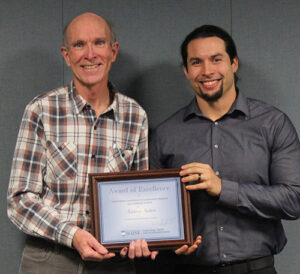 Outstanding Contribution by a Graduate Student to Sustainability Research
Outstanding Contribution by a Graduate Student to Sustainability Research
Anthony Sutton
Tony has contributed to numerous sustainability efforts on campus and within the Penobscot, Passamaquoddy and MicMac communities. These include his involvement in the Partnerships for a Sustainable Maine, co-teaching the sustainability course, mentorship of graduate and undergraduate students in the ‘Removing our Blinders’ and ‘Materials Management’ projects, and his role on the Science Advisory Committee with the Maine Shellfish Restoration and Resilience Fund (MSRRF), among other efforts. Across all of these, Tony brings his humility, dedication, and deep intelligence to help his collaborators learn what it means to practice listening, presence, and mutual respect so collectively these efforts may begin to unthread patterns of colonialism that make complex sustainability problems even more wicked. For example, on the MSRRF, Tony has helped stakeholders from the Maine Department of Marine Resources, municipalities and harvesting communities, grantors, and other academics consider how indigenous methods can inform engaged research efforts to make them more sustainable and just.
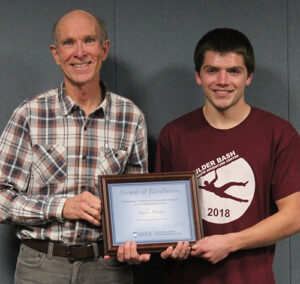 Outstanding Contribution by an Undergraduate Student to Sustainability Research
Outstanding Contribution by an Undergraduate Student to Sustainability Research
Skyler Horton
For the past two years, was a member of the Interdisciplinary Undergraduate Research Collaborative and a Diana Davis Spencer Scholar. Skyler not only conducted his individual research on risk perceptions associated with food waste processors with great success, he was a critical member of our research collaborative, where he served as a leader and a model of the Mitchell Center’s work on interdisciplinary, solutions-oriented, sustainability research. As part of his food waste research, he worked with other undergraduate students from diverse disciplines, including engineering, economics, and nursing. He presented – multiple times! – the complex research of an engineering colleague to audiences at conferences, poster presentations, and prepared talks. This despite the fact that his area of study is the human dimensions of climate change. His engagement with other disciplines, his enthusiasm for the research, and his unique and outstanding leadership skills make him a worthy recipient of this award.
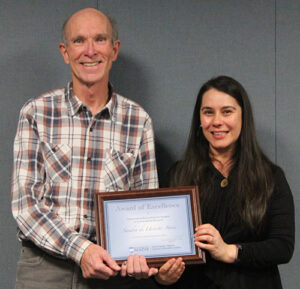 Outstanding Mentorship of a Student in Sustainability Research
Outstanding Mentorship of a Student in Sustainability Research
Sandra De Urioste-Stone
Sandra encourages co-mentorship so that students can build upon social and biophysical skill sets needed to answer complex sustainability issues. Her ability to connect faculty with students across departments on projects and through co-mentorship promotes a community of interdisciplinary colleagues that is necessary to tackle sustainability challenges in the state of Maine.
Collaborating with Sandra has been one of the great joys of my time at UMaine. She is an amazing strategist and has a real gift for forming interdisciplinary teams, building consensus, and developing a shared research agenda to solve interdisciplinary problems. Her generosity and her mentorship of junior colleagues are nothing short of extraordinary.
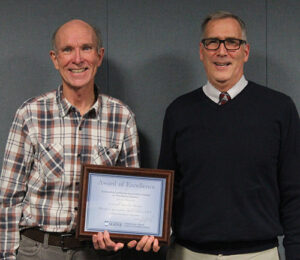 Outstanding Contribution by an External Partner on the “Road to Solutions”
Outstanding Contribution by an External Partner on the “Road to Solutions”
George Parmenter, Sustainable Retailing Manager, Hannaford Supermarkets, Ahold Delhaize USA
George has been an outstanding partner to our Mitchell Center project to identify triple bottom line solutions to Maine’s food waste issues.
Through George’s efforts Hannaford acts as an on-going leader in seeking triple bottom line solutions for their excess food production/food waste. In this role they provide a strong example of a bottom-line driven organization who has found it economically advantageous to pursue food waste solutions that also help Maine communities and environment.
Hannaford assisted in our efforts to train student researchers to work with stakeholders by providing experienced food waste stakeholders for our training evening. They were also an active participant at our recent ME Food Production Leadership Council working session – encouraging collaborative discussions by all stakeholders through their open approach to the issues.
Hannaford is always happy to answer questions and provide assistance to our team. It is great to have such a high caliber and respected organization to work with in this major effort to find solutions for Maine’s food system/food waste issues.
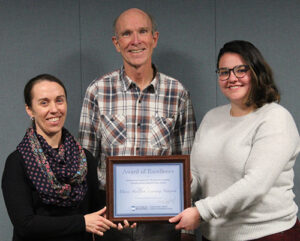 Outstanding Progress on the “Road to Solutions” by an Interdisciplinary Research Team
Outstanding Progress on the “Road to Solutions” by an Interdisciplinary Research Team
Maine Shellfish Learning Network
The Maine Shellfish Learning Network is a first-of-its-kind attempt to bring together stakeholders and researchers of all kinds to find solutions to major challenges faced by Maine coastal communities. Bridie McGreavy and her team are totally committed to achieving this goal and it is a prime example of how best to conduct interdisciplinary, stakeholder-engaged, solutions-driven research. I have never seen such meaningful communication between researchers and shellfish harvesters, regulators, and many other stakeholders than at Maine Shellfish Learning Network meetings organized by Bridie and her colleagues. This project is thriving and growing thanks to their efforts.
